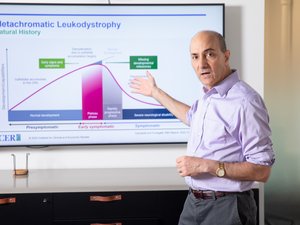
A Cambridge-based therapeutics company is working on a gene therapy aimed at a key protein in the eye that it says will help older adults against macular degeneration.
Cirrus Therapeutics is a spinout of the University of Bristol in the U.K. Its focus is on age-related macular degeneration, or AMD. The disease that causes a loss of vision in older patients and impacts 12.9% of the U.S. population over 40 years old, according to the CDC.
Cirrus announced its plans focused on ocular immunology in the latest issue of Science Translational Medicine.
“We don't just want to live longer, we want to live healthier for longer,” said co-founder and CEO Ying Kai Chan. “We think that this work is a great example of a targeted scientific intervention targeting a root cause of aging so that we can really prolong health span in a sustainable way.”
Cirrus was co-founded by Chan, the former chief scientific officer of Ally Therapeutics and a researcher at the Wyss Institute for Biologically Inspired Engineering, and by Andrew Dick, professor and head of the academic unit of ophthalmology at the University of Bristol and director of the University College London Institute of Ophthalmology.
- Sign up for The Beat, BostInno’s free daily innovation newsletter. See past examples here.
AMD occurs when cells known as retinal pigment epithelium die. They are responsible for keeping the retina, rods and cones healthy.
Cirrus’ research revolves around a critical protein found in the eye, the IRAK-M protein, which helps to maintain cell health but decreases with age. The local company is developing a gene therapy in which they inject the IRAK-M protein directly into the eye, boosting its production within the eye. In their research, Chan and Dick discovered that injection of the protein can protect against degeneration of the retina.
“We believe that this could be a groundbreaking approach for how AMD will be treated,” said Chan.
Cirrus first saw results in petri dish studies, and when they moved on to animal studies, the results were promising. In two mouse models of the disease, Cirrus injected genetic instructions and saw that IRAK-M helped protect the retina from degeneration.
“You are protecting that cell much better than just targeting a single pathway,” said co-founder Dick, “So that was why we were very excited about discovering the critical protein in this cell that does so many activities against so many of the pathways that are operative in AMD.”
Cirrus is currently in preclinical development, and company officials hope regulators will greenlight it for clinical trials to introduce the new treatment to patients.
- Subscribe to our BioFlash, TechFlash and Real Estate newsletters — all free.








